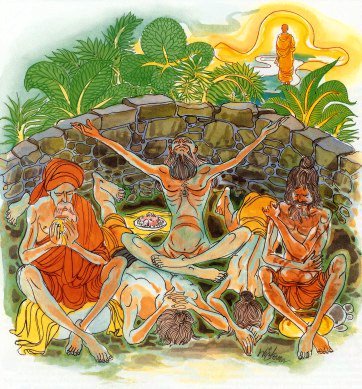Not going naked, nor matted hair, nor filth,
nor fasting, not sleeping on bare earth,
no penance on heels, nor sweat nor grime
can purify a mortal still overcome by doubt.
Explanation: A person seeking the purification of his soul may practice the ritual of wandering about naked; or else he may wear turbans; he may even smear his body with mud; he may even refrain from partaking of food as an austerity to obtain purity; he may lie on bare earth; or else he may throw dust all over his body. And again, some may practice a squatting posture. All of these will not wash a person into spiritual purity if his wavering of mind is not overcome.
The Story of Venerable Bahubhandika (Verse 141)
While residing at the Jetavana Monastery, the Buddha spoke this verse, with reference to Bahubhandika, a monk with many possessions.
Once there was a rich man in Savatthi. After the death of his wife, he decided to become a monk. But before he entered the sangha, he built a monastery, which included a kitchen and a store room. He also brought his own furniture, utensils and a large stock of rice, oil, butter and other provisions. Whatever dishes he wanted were cooked for him by his servants. Thus, even as a monk he was living in comfort, and because he had so many things with him, he was known as Bahubhandika. One day, other monks took him to the Buddha, and in his presence told the Buddha about the many things he had brought along with him to the monastery, and also how he was still leading the luxurious life of a rich man. So, the Buddha said to Bahubhandika, “My son, I have been teaching all of you to live an austere life; why have you brought so much property with you?” When reprimanded even this much, that monk lost his temper and said angrily, “Indeed, venerable! I will now live as you wish me to.” So saying, he cast off his upper robe.
Seeing him thus, the Buddha said to him, “My son, in your last existence you were an evil spirit; even as an evil spirit you had a sense of shame and a sense of fear to do evil. Now that you are a monk in my Teaching, why do you have to throw away the sense of shame, and the sense of fear to do evil?” When he heard those words, the monk realized his mistake; his sense of shame and fear to do evil returned, and he respectfully paid obeisance to the Buddha and asked that he should be pardoned. The Buddha then said to him, “Standing there without your upper robe is not proper; just discarding your robe etc., does not make you an austere monk; a monk must also discard his doubt.”

